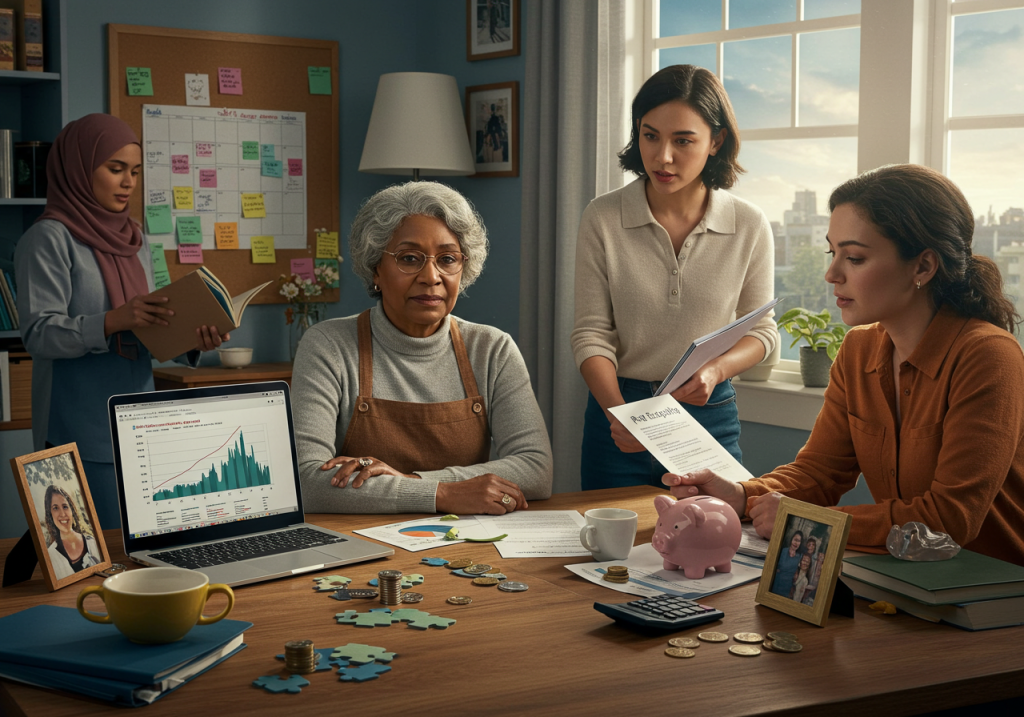What Should Women Know About Retirement Planning?

Planning for retirement is a crucial step in securing a stable financial future, especially for women who often face unique challenges in this area. So, what should women know about retirement planning? First and foremost, understanding your financial situation is essential. Since women tend to live longer, retirement savings need to be carefully structured to last. Think of it as planting a garden—you want to ensure you have enough seeds to reap benefits throughout every season of life. Start by evaluating your savings, debts, and expenses. A well-organized budget can highlight your income sources and spending habits, giving you greater control over your financial well-being.
Another key aspect to consider is investing. Many women hesitate when it comes to the stock market, often feeling uncertain about where to begin. However, investing is a powerful tool that helps your money grow over time. Picture it like a fire: the more logs you add, the bigger the flame becomes. Whether through retirement accounts, mutual funds, or stocks, taking small steps toward investing can significantly impact your financial security in the long run.

Additionally, Social Security plays a pivotal role in retirement planning. It acts as a financial safety net, but knowing when to start claiming benefits is crucial. The timing of your claim can affect how much you receive in monthly payments, influencing your overall retirement income. Understanding the details of Social Security and making informed decisions can enhance your financial stability.
Seeking professional guidance is another step that should not be overlooked. Having a financial advisor is like using a GPS for your retirement journey—they help navigate complex financial landscapes, ensuring you stay on track toward your goals. A professional specializing in retirement planning can offer tailored strategies that align with your specific needs and aspirations.
So, what should women know about retirement planning? It’s all about preparation, investing wisely, understanding Social Security, and seeking expert advice. With the right strategies, securing a comfortable and stress-free retirement can be as smooth as butter on warm toast!
Empowering Futures: Essential Retirement Planning Tips Every Woman Should Know
Starting your retirement planning early is one of the smartest financial moves you can make. The earlier you begin saving, the more time your money has to grow through the power of compound interest. Think of it as planting a tree—the sooner you plant, the more shade it provides later in life. So, what should women know about retirement planning? It all starts with taking action now.
Financial literacy is another crucial component. Understanding investments, interest rates, and portfolio diversification can be game-changing. Imagine having a well-equipped toolbox—you wouldn’t use a hammer for every task, right? Similarly, knowing which investment strategy to use at the right time can maximize your retirement savings.
Addressing debt is equally important. High-interest debt, like weeds in a garden, can hinder financial growth. Tackling debt early allows your savings to flourish, helping you build a strong financial foundation for retirement.
Lifestyle planning is another key aspect. Retirement isn’t just about saving—it’s about shaping the future you want. Whether it’s traveling the world or starting a small business, keeping your dreams in mind will help guide your financial decisions and ensure your retirement is fulfilling.
Finally, professional guidance can be invaluable. Think of financial planners as retirement coaches who create tailored strategies for your unique needs. Investing in expert advice can help you navigate the complexities of retirement planning with confidence.
So, what should women know about retirement planning? Start early, educate yourself, eliminate debt, plan for your ideal lifestyle, and seek expert advice. With these steps, securing a comfortable and rewarding retirement is well within reach.
Beyond the Paycheck: Unpacking the Unique Retirement Challenges Faced by Women
Women often juggle multiple roles—whether as caregivers, part-time workers, or career changers—which can lead to career gaps and impact their long-term financial security. These interruptions create challenges in building substantial retirement savings, making it essential to plan ahead. Think of it like saving for a dream vacation while also dealing with unexpected home repairs—it requires careful financial balancing.
A significant factor influencing women’s retirement planning is the persistent gender pay gap. Research shows that women, on average, earn less than men over their lifetimes, which directly affects their ability to save for the future. It’s not just a statistic; it’s a reality that can make retirement planning feel like completing a puzzle with missing pieces. Understanding this disparity is crucial to developing strategies that close the gap and ensure financial stability.
Social Security benefits also play a vital role in women’s retirement plans. Since women tend to live longer, they rely more on these benefits. However, due to lower lifetime earnings, their payments are often smaller. It’s like trying to stay dry in a storm with only a small umbrella—insufficient without additional financial support.
So, what should women know about retirement planning? Recognizing these challenges, taking proactive financial steps, and seeking professional guidance can make a significant difference in securing a comfortable and stress-free retirement.

From Savings to Security: A Woman’s Guide to Crafting a Robust Retirement Plan
When it comes to retirement, financial planning is key. Savings matter, but how you manage your money is even more crucial. Think of your savings as seeds in a garden—they require care and attention to thrive. A well-diversified investment portfolio can help create multiple income streams, much like a river feeding into a vast, flourishing lake. Stocks, bonds, and real estate can all play a role in building long-term financial security.
Confidence is just as important as strategy. Have you ever felt empowered after mastering a challenging workout? That same mindset applies to financial planning. Visualization can be a powerful tool—picture yourself enjoying a stress-free retirement, perhaps lounging on a beach with no financial worries. Keeping this vision in mind can serve as motivation to stay committed to your savings and investment goals.
Building a strong financial future doesn’t have to be a solo journey. Surrounding yourself with like-minded women can make the process more engaging and inspiring. Consider joining financial forums or local groups where you can share insights and strategies. Think of it as a book club, but instead of discussing novels, you’re exchanging valuable financial tips and resources.
At its core, a solid retirement plan is like a well-built house—it starts with a strong foundation. Regularly reviewing and adjusting your financial goals will help ensure stability and growth over time. By taking these steps, you can confidently work toward a secure and fulfilling retirement.
The Gender Gap in Retirement: What Women Need to Tackle for Financial Independence
One of the most significant challenges women face in retirement planning is career interruptions. Whether stepping away to raise children or care for aging parents, many women find themselves pausing their careers. It’s like hitting the brakes on a fast-moving car while others speed ahead. Each year spent out of the workforce often results in fewer contributions to retirement accounts, making it harder to build long-term financial security.

However, it’s never too late to take control of your financial future. Women can proactively address these challenges by investing early and diversifying their portfolios. Think of it like planting a garden—the sooner the seeds are sown, the bigger the harvest. Understanding and maximizing retirement accounts, such as IRAs and 401(k)s, can provide a strong foundation for long-term stability and growth.
Financial education and networking are also essential. Knowledge is a powerful tool, and building financial literacy creates a solid foundation for independence. Engaging with financial communities, sharing experiences, and learning from others can be invaluable in navigating the road to financial security. While the path may be complex, the right strategies and resources can empower women to achieve lasting financial independence.




